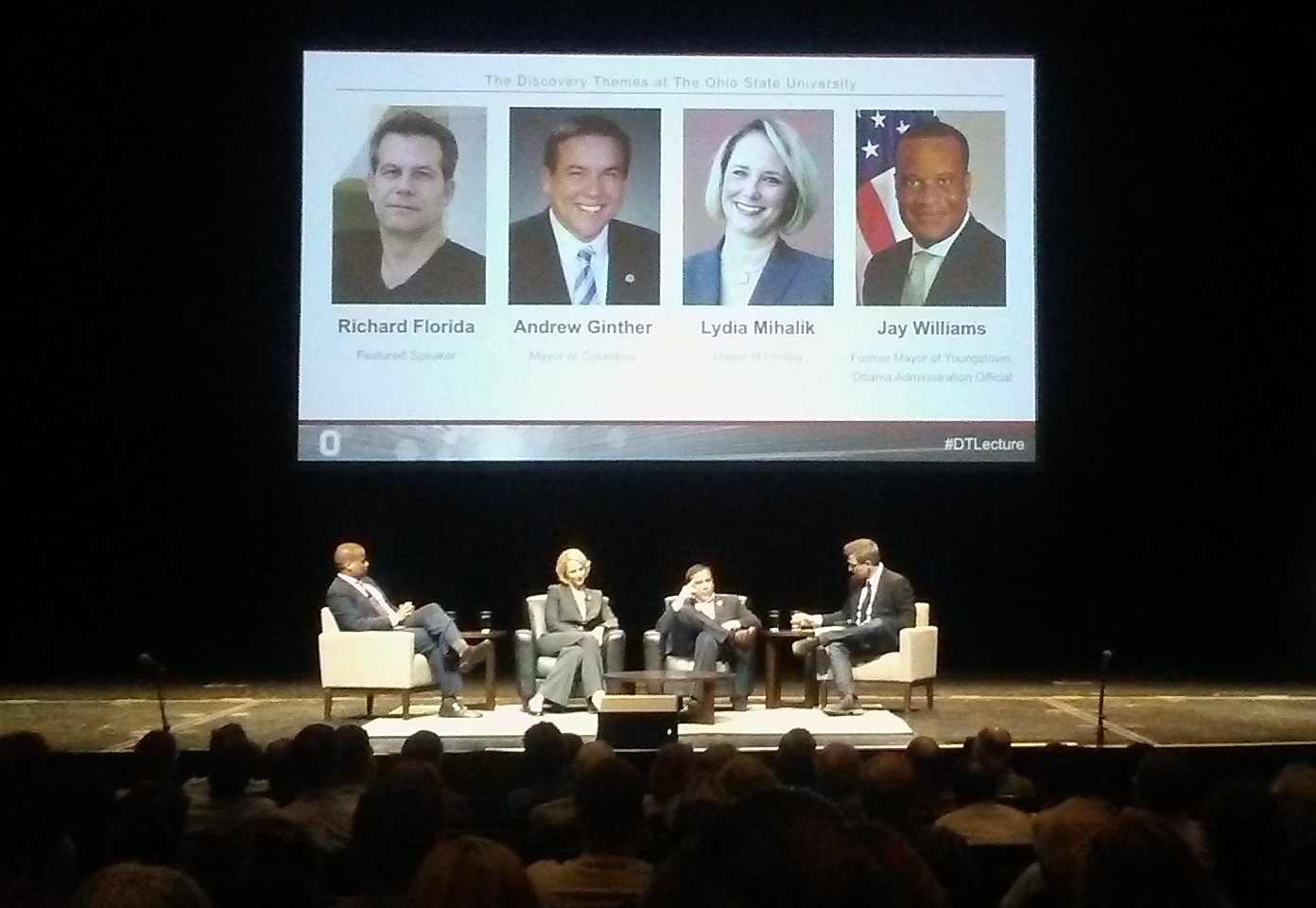Recently, University of Toronto professor and urban theorist Richard Florida delivered a series of lectures in Columbus. In front of a large crowd at Ohio State’s Mershon Auditorium, he spoke about his new book, The New Urban Crisis, which describes the worrying decline of the middle class in cities throughout America. After highlighting the major points of the book, Florida asked questions about solving the new urban crisis to Columbus Mayor Andy Ginther, Findlay Mayor Lydia Mihalik, and former Youngstown Mayor Jay Williams.
Urban Expert Richard Florida Warns of Deepening Crisis of Cities But Believes Mayors Can Help Reverse Course
By Alex Highley, GOPC Project AssociateLast week, University of Toronto professor and urban theorist Richard Florida delivered a series of lectures in Columbus. In front of a large crowd at Ohio State’s Mershon Auditorium, he spoke about his new book, The New Urban Crisis, which describes the worrying decline of the middle class in cities throughout America. After highlighting the major points of the book, Florida asked questions about solving the new urban crisis to Columbus Mayor Andy Ginther, Findlay Mayor Lydia Mihalik, and former Youngstown Mayor Jay Williams.
Florida argues that whereas the urban crises of past decades manifested in the outward movement of people and wealth from city centers into the suburbs, today’s urban crisis is marked by a growing wealth and opportunity gap throughout neighborhoods in cities, including Columbus. While the vestiges of the old urban crisis continue to live on, Florida sees a startling inequality both between various cities and even within cities. Today, a “winner-take-all urbanism” has emerged that sharpens the contrast between “winner” and “loser” cities. As young, talented, and educated, people seek to work together on innovative ideas, they cram themselves together in those areas of concentrated resources and wealth. Even within “winner” cities, suburban areas, along with some traditional urban areas, have experience marked decline and poverty while economic cleavages between neighborhoods have become more pronounced.
Check out Greater Ohio Policy Center’s (GOPC) new blog series on shrinking cities
To combat this modern crisis, Florida believes that mayors must be given the political and fiscal tools to develop local solutions, instead of following a one-size-fits-all federal urban policy, which Florida admits he previously championed. Devolving more responsibility to mayors recognizes the reality of deep social and political differences in America, which were conspicuous during the last presidential election, and allows mayors and community leaders to promote urban policies unique to their cities. In alignment with this idea, Williams believes that Youngstown should take the unconventional step of embracing its “shrinkage,” rather than expending energy on attempts to attract new residents. To do this, the city must develop policies that accept the nature of population decline while seeking to capitalize on the great ideas and creativity already flourishing in Youngstown.
Seated Left to Right: Williams, Mihalik, Ginther, and Florida
Ginther, Mihalik, and Florida expressed that improving and expanding local public transportation systems will help boost economic opportunity for struggling families. For residents in many neighborhoods in Columbus, a lack of reliable transportation imposes a barrier to employers and the potential employees seeking work. In Findlay, Mihalik notes that over half of the city’s workforce actually commutes from outside Hancock County; as a result, many people are pushing for bolstering public transportation.Greater Ohio Policy Center (GOPC) supports efforts to connect Ohioans to job opportunities by improving public transportation networks throughout the state.
While many people are encumbered by today’s often divisive national politics, Florida sees less partisanship and more willingness among stakeholders to work together to achieve results at the local level. Florida notes that when he meets mayors, he usually has little idea or concern about whether they are Republican or Democrat, because party identity is less defining of the policies mayors pursue. Mihalik emphasizes the idea that mayors can elevate important public policy discussions, and should do more to promote civil dialogue among citizens. She also believes that leaders need to offer more potential solutions to problems, rather than simply criticizing what they think needs to be fixed. In sum, combining mayoral action with citizen input will help expand economic opportunity for more Ohioans.


